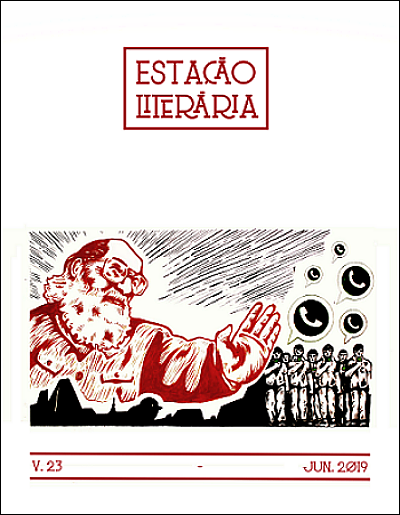The degradation of the house and the body in confinement in the short story Holocaust, by Caio Fernando Abreu
DOI:
https://doi.org/10.5433/el.2019v23.e35724Keywords:
Caio Fernando Abreu, narrative space, Calcutta Stones, Brazilian civil military dictatorship.Abstract
In this paper we analyze the short story "Holocaust", by the writer Caio Fernando Abreu, published in the book Stones of Calcutta, in 1977, a period known in Brazil as the "years of lead" of the military dictatorship. The proposal is to observe, in this short story, the relationship between the literary categories "narrator" and "space", based on the concepts of heterotopia (Foucault - 1967), and trauma (Ginzburg - 2000 and Seligmann-Silva- 2008). The experience of confinement develops from the increasing degradation of the house and the body, constituting a structural use of space in the narrative, an aspect also explored in the analysis.Downloads
References
ABREU, Caio Fernando. Ovelhas Negras. Porto Alegre: Editora Sulina, 1995.
BECKER, Annette. Extermínios: o corpo e os campos de concentração. In: CORBIN, Alain; COURTINE, Jean-Jacques; VIGARELLO, Georges (org.). História do corpo 3: as mutações do olhar, o século XX. Rio de Janeiro: Vozes, 2008.
BENJAMIN, Walter. O Narrador. In: BENJAMIN, Walter. Magia e técnica, arte e política: ensaios sobre literatura e história da cultura. São Paulo: Brasiliense, 1994.
BENJAMIN, Walter. Experiência e Pobreza. In: BENJAMIN, Walter. Magia e técnica, arte e política: ensaios sobre literatura e história da cultura. São Paulo: Brasiliense, 1994.
CANDIDO, Antonio. A nova narrativa: a educação pela Noite & Outros Ensaios. São Paulo: editora Ática, 2000.
FOUCAULT, Michel. De outros espaços. Disponível em: http://www.virose.pt/vector/periferia/foucault_pt.html. Acesso em: 15 fev. 2014.
GINZBURG, Jaime. Autoritarismo e literatura: ahistória como trauma. Vidya. Santa Maria, v. 19, n. 33, p. 43-52, 2000.
SELIGMANN-SILVA, Márcio. História como Trauma. M. Seligmann-Silva e A. Nestrovski (org.) Catástrofe e Representação. São Paulo: Escuta, 2000.
SELIGMANN-SILVA, Márcio. Narrar o trauma: a questão dos Testemunhos de Catástrofes Históricas. Psic. Clin., Rio de Janeiro, v.20, n.1, p. 65 - 82, 2008.
Downloads
Published
How to Cite
Issue
Section
License
Copyright (c) 2019 Estação Literária

This work is licensed under a Creative Commons Attribution 4.0 International License.
A revista se reserva os direitos autorais sobre as contribuições publicadas, sem retribuição material para o autor, podendo disponibilizá-las on-line no modo Open Access, mediante sistema próprio ou de outros bancos de dados; também poderá efetuar, nos originais, alterações de ordem normativa, ortográfica e gramatical, com o intuito de manter o padrão culto da língua, contando com a anuência final dos autores. As opiniões emitidas pelos autores são de sua exclusiva responsabilidade.













